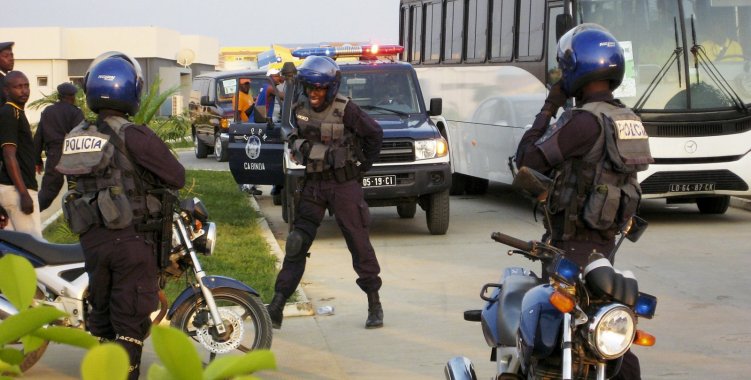According to the president of the Association for the Development of the Culture of Human Rights (ACDH) of Cabinda, Alexandre Kuanga, the organizers of this demonstration are part of the Luanda nucleus.
Around 11am this Monday, the demonstrators tried to gather in front of the Portuguese embassy, but were stopped by the police, who were already there in large numbers.
The Avenida de Portugal, where the Portuguese embassy is located, was under heavy police force this morning and Lusa noticed at the scene that at least one person, who called for the release of Cabinda and shouted "murderers," was put in a prison van.
The human rights activist said that six of the dozens of demonstrators who came to the scene were arrested and were driven in a police car to Bengo province.
"We have been informed that they have already passed the 30 kilometer marker towards Bengo, from 11:30 a.m. until here it is not known where they are being taken. Henrique do Rosário Macosso Sita, Simão Tadila, MC Life, Hamilton, Meslei Zinga and Emerson were arrested. These are the six who are being arrested and taken to Bengo. This is the information that I have so far as president of the HCHR in Cabinda," he said.
According to the president of the HCHR, when the organizers arrived on the scene they began to be warned by the police that they could not be there, claiming that it was a normal day's work and that gatherings on the streets were prohibited, as determined by the state of public calamity, due to covi-19.
The demonstration, whose authorization was denied by the Government of the Province of Luanda, was scheduled for this Monday, the date on which the Treaty of Simulambuco was signed, which sealed the creation of a Portuguese protectorate, in which Portugal committed itself to maintaining the integrity of the territories.
"For the activists this date is what made the disaster of the people of Cabinda regarding the problems that are happening here, looting resources and the lack of economic and social development of Cabinda, because Portugal did not respect that treaty and therefore annexed Cabinda to Angola," he said.
The Cabindan independents argue that the territory was an independent colony of Portugal and should have been treated as such in the process of independence of Angola.
In contrast, Cabinda, the territory from which most of Angola's oil is extracted, has become a province and has been the scene of confrontations by armed elements demanding its independence.
Alexandre Kuanga stressed that until now "there is war, armed conflict in Cabinda", a situation that is "due to this treaty.
The demonstrators "went to the Portuguese embassy so that Portugal could intervene, so that there would be peace in Cabinda and stop the conflict that exists in Cabinda as a consequence of the Alvor agreement (in 1975, which established the independence process of Angola) in violation of the Simulambuco Treaty," he stressed.
The activist pointed out that they are following the situation of their colleagues from Cabinda, having already contacted the Association Mãos Livres, to monitor and provide legal assistance to the detainees.
"We here in Cabinda, if they stay 48 hours, we will activate a demonstration to press for their release," he said.
Asked if it was also organized in Cabinda any demonstration alluding to the date, Alexandre Kuanga said that the provincial government prevented the action and "filled the streets with police".
"Here in my house arrived at 6am, a Land Cruiser car and two motorcycles, following any step that could mark. All the arteries we passed when we organized a demonstration filled with policemen. The only thing we did was go to Ecclesia radio to express our dissatisfaction," he added.
Also in statements to Lusa, the lawyer Aaron Tempo, appealed to national human rights organizations to defend the rights of detainees as well as the "inalienable right of the people of Cabinda".
"These organizations based in Luanda, which have never paid much attention to the territory of Cabinda, to put themselves in their true sense of defending human rights, as well as international organizations, to find a model to assist the people of Cabinda, and there are no diplomatic representations in Cabinda," he said.
Lusa tried to contact the police for more information, but without success.
The province of Cabinda, where most of the country's oil reserves are located, is not contiguous with the rest of the territory and for many years local leaders have been advocating independence, claiming an autonomous colonial history of Luanda.







